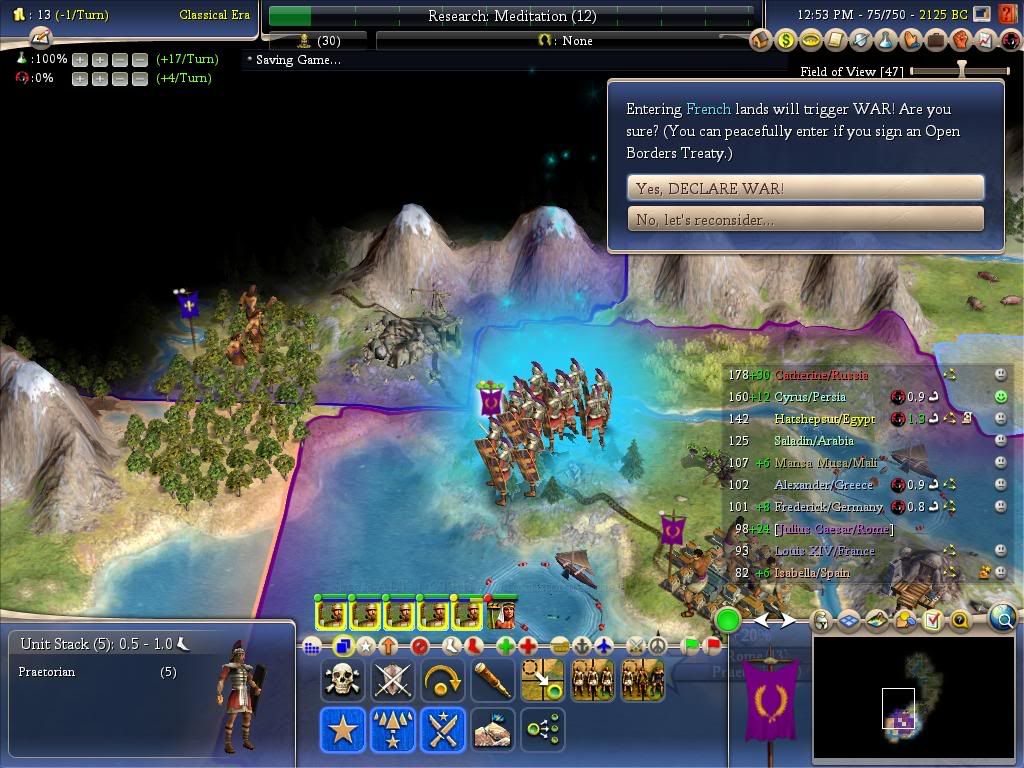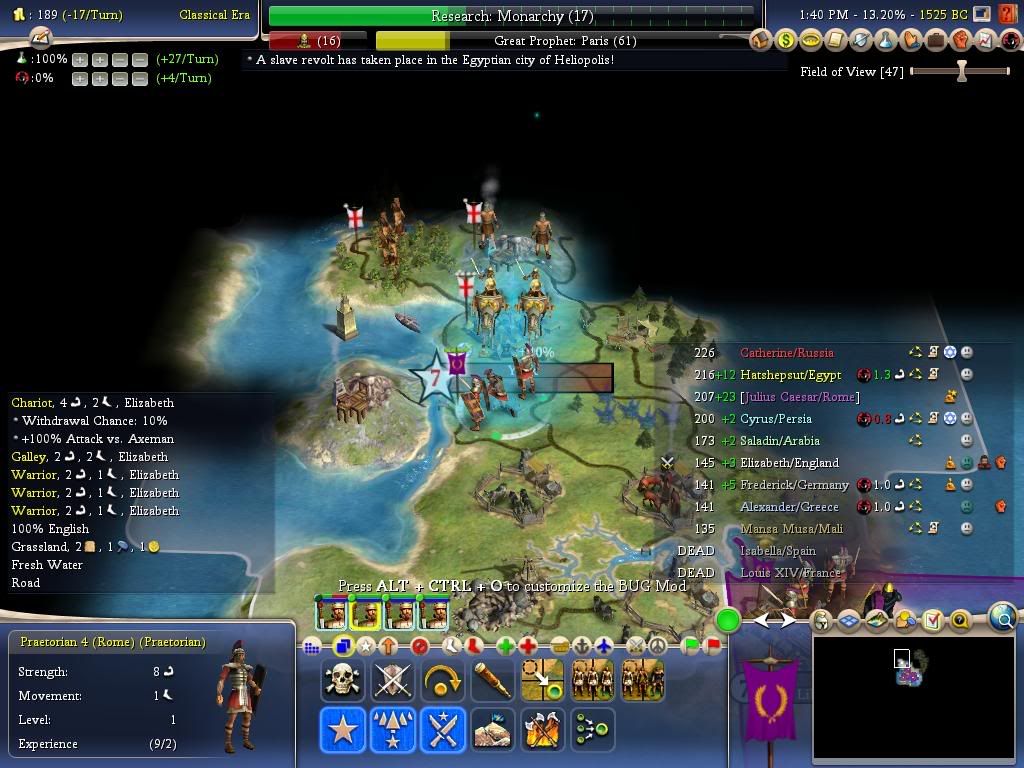Julius Caesar strode through the parade grounds, inspecting the Praetorans lined up before him. He'd come out with the intention of correcting his soldiers' postures, pointing out rusted bits of armor, even picking bits of lint off of shoulders. But, much to his annoyed delight, his Swordsmen were perfect. They stood ready to impose his will upon the globe with disciplined determination. Caesar had but to unleash them.
Before he could do that, though, he would need more of them. And he would need to bring Rome out of the Dark Ages. Roman metalworking was a valuable trade chip, and Caesar would need to leverage it to improve the lives of his people:
Some of these trades were ill-advised, perhaps, but they brought in valuable technologies. The Wheel, especially, would serve to connect all of Europe once it was under Roman control.
By 2125 B.C., a reasonable force of Praetorians stood ready to bring the continent to its knees:
As they marched through the hilly, forested French interior, the Roman troops were continually harassed by screaming, club-wielding brutes. Discipline and superior weaponry won the day, though, and the army pressed on.
Back home, meanwhile, Caesar made a big international stink about Persian spies loitering about Roman taverns, gathering intelligence to send back to their inscrutable overseers. Both Caesar and Cyrus knew this was bunk, of course. Both knew that the Sicilian villages were the real prize, and the Persian warlord accepted the Closed Borders with a wink and a smile. But the international harangues made good theater for the masses, and the minor tribes were left unmolested for inclusion in the Roman Empire. When the borders enveloped them, they peacefully accepted their fate, offering up knowledge of clayworking:
A minor boon, perhaps, but a boon nevertheless. The villagers resettled in Rome, plying their trade and eventually becoming a wealthy clan of artisans in the Eternal City.
The Roman army topped the final ridge, scattering a band of masons that were using a crude wooden rig to extract Stone from the hill, and caught their first glimpse of Paris:
It was a formidable fortress: a walled collection of huts and lean-tos staffed with an absolutely massive mob of the barbarous Frenchmen the Praetorians had fought before. And in the middle, next to the massive, towered tent that must have been Louis' abode stood a ring of standing stones that inspired religious awe in the hearts of even the most stoic soldier.
Orders were orders, though. The savages died behind their walls as easily as they had in the field. After a short delay to capture the screaming Workers running around outside the Walls, Paris flew the flag of Rome:
The Palace did not survive the battle (and Louis is believed to have perished inside the ridiculous, toppling thing), but Stonehenge survived, lending an air of divine legitimacy to the coup.
Out of the war arose a great military leader, Sun Tzu, who taught to strike when you are strong, and withdraw when you are weak:
And what better way to encourage strength and avoid weakness than through the use of a Supermedic? I went the Medic I/Woodsman III route rather than Medic III since WM3 also offers a few fun offensive abilities that should help him to contribute and reach Medic III in the future.
No sooner than Louis' grip on the continent loosened, though, than the wolf-queen Isabella attempted to swoop in and claim the territory as her own:
Needless to say, this would not be permitted.
The offending Settlers were quickly dispatched, and sent off in chains to further beautify Italy and France. Madrid itself then came under assault:
The wounded veterans of the war with France hung back and recovered under Sun Tzu's tender ministrations in between the general's personal forays against the Spanish capitol.
After a bit of recuperation, the Praetorians were once again in fighting shape, and joined the siege. Madrid fell easily:
And Isabella was taken away to be Caesar's bride.
In 1850 B.C., the Buddhist faith spread to Paris:
And was already present in both Rome and (obviously) Madrid. This was a sign to the Roman overlord. He himself was inducted into the faith and officially married to Isabella among his troops in her riotous former capital. After a short period of Anarchy at the news of an official faith being imposed upon the people, they followed suit and adopted Buddhism.
With peace settling over the land, it was time to make a few more trades, finally allowing us to improve those pesky northern Italian resources:
But all was not necessarily roses in the Roman world. English and German cultural pressure weighed heavily on the people of Paris. The Greeks were as yet a peacable people, but their Phalanxes nevertheless posed a threat on the eastern border.
Ultimately, the decision was made to move against the Virgin Queen, Elizabeth. In yet another lightning war, Paris whipped together a Galley and rowed our Praetorians to glory!
Perhaps Londinium should have been razed and refounded to the west, but it was a size 7 city by this point, so I relented. The troops proceeded to march northward, towards York.
On the home front, Roman officials were stunned to discover that The Oracle had not yet been built in a distant land. The people of the Eternal City, sick of building Praetorian after Praetorian, anyway, rushed it to completion:
We took Metal Casting, which not only solidifies our status as the world's premier metalworkers, but is also a massive trade chip for future negotiations.
York, to the north, had built another World Wonder that would be huge for our economy in the future:
The Great Lighthouse, on a map this size, with this many coastal cities, is close to gamebreaking. We lucked out, massively! And what happened to Elizabeth, you ask? Well, Caesar took her, too, as a bride, but days later, she was found mysteriously poisoned. Isabella, knitting quietly at a window, was unmoved when accused of the murder. "Polygamy is a vice. Buddhist men should not crave such things." Caesar didn't take any more wives after that.
By 1375 B.C., all of Europe west of the Rhine was Roman:
And we even have a presence in North Africa. I figured that claiming Algiers (and possibly another city farther west-that Mali contingent on the strait of Gibraltar doesn't include a Settler at the moment) was more important than settling Sicily or Marseilles (though those are both long-term projects). I guess the question is, do we turtle up for a while and turn into an economic powerhouse, or do we roll into Germany? Or maybe Greece? Oh, and I haven't unleashed Metal Casting on the trade markets yet.
What do you think?
Here's the save:
 ) ... a little less that 1/5 ( the little less is because of the peculiar war that Civ IV handles the goody huts pop outputs where one or more of the possible outcomes is blocked: if it gets a forbidden result, it simply rerolls up to ten launchs. If it gets ten forbidden results on a row, it simply gets out of the loop and the hut gives nothing .... )
) ... a little less that 1/5 ( the little less is because of the peculiar war that Civ IV handles the goody huts pop outputs where one or more of the possible outcomes is blocked: if it gets a forbidden result, it simply rerolls up to ten launchs. If it gets ten forbidden results on a row, it simply gets out of the loop and the hut gives nothing .... )



















 Nice job, BTW, as usual.
Nice job, BTW, as usual.  Why stop now? Germania and Greece deserve civilized Roman rule, don'cha think?
Why stop now? Germania and Greece deserve civilized Roman rule, don'cha think? 
 P. S I forgot this is Deity... so most likely Monty 2nd city would get the holy city tile
P. S I forgot this is Deity... so most likely Monty 2nd city would get the holy city tile